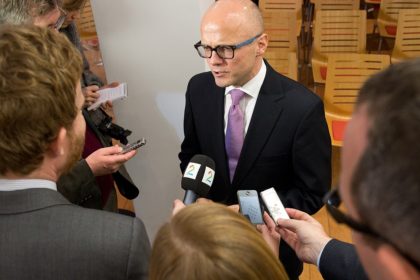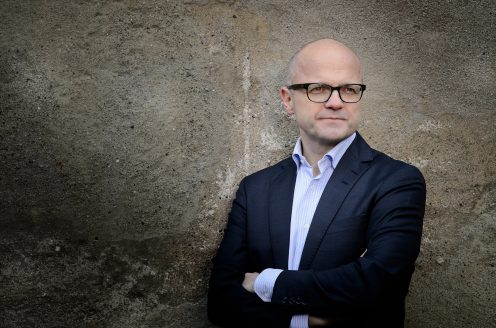Vidar Helgesen to succeed Lars Heikensten as Executive Director of the Nobel Foundation at the beginning of 2021

Vidar Helgesen – Norway’s former State Secretary in the Ministry of Foreign Affairs, Minister of European Affairs and Minister of Climate and the Environment – will become the new Executive Director of the Nobel Foundation at the beginning of 2021. He will thus assume the task of strengthening the long-term finances and position of the Nobel Prize as well as further developing the public activities surrounding the Nobel Prize in Sweden, Norway and internationally.
“The mission of the Nobel Foundation and the legacy of Alfred Nobel are more important than ever. To me, the Nobel Prize stands for science, free expression and peaceful dialogue. It also rewards concrete achievements that strengthen these values. The Nobel Prize is a brand and a platform that promote values showing how we can meet the major challenges of our era,” Mr Helgesen says.
“Vidar Helgesen has extensive experience of international cooperation on issues related to climate, democracy and human rights. These are central themes for the Nobel Prize, but above all it is Helgesen’s long experience of leading and developing idea-based activities that make him right for the role of Executive Director at the Nobel Foundation,” says Carl-Henrik Heldin, Chairman of the Nobel Foundation’s Board.
Today Vidar Helgesen (born 1968) is Norway’s Special Envoy to the international High Level Panel for a Sustainable Ocean Economy. Helgesen has worked as a lawyer, diplomat and politician; this has included serving as Norway’s State Secretary for Foreign Affairs, Minister of European Affairs and Minister of Climate and the Environment. He has also been the Secretary-General of the International Institute for Democracy and Electoral Assistance (IDEA) and has previously worked for the International Red Cross. During his period as State Secretary, Helgesen brokered peace negotiations in Sri Lanka and the Philippines. He has also served on the boards of the Centre for Humanitarian Dialogue in Geneva and the Norwegian Refugee Council, among other organisations.
The Trustees and the Board of the Nobel Foundation have decided that Vidar Helgesen will succeed Lars Heikensten on the Board and as Executive Director starting on 1 January 2021. Dr Heikensten, who assumed the post of Executive Director of the Nobel Foundation in 2011, is retiring at the end of 2020.
“To me, the Nobel Prize stands for science, free expression and peaceful dialogue”
Vidar Helgesen – Norway’s former State Secretary in the Ministry of Foreign Affairs, Minister of European Affairs and Minister of Climate and the Environment – will become the new Executive Director of the Nobel Foundation at the beginning of 2021. He will thus assume the task of strengthening the long-term finances and position of the Nobel Prize as well as further developing public activities surrounding the Nobel Prize in Sweden, Norway and internationally.
Interview with Vidar Helgesen
Congratulations! How do you feel about the news?
I’m feeling excited about it!
Why did you accept the job as the new Executive Director of the Nobel Foundation?
The mission of the Nobel Foundation and the legacy of Alfred Nobel are more important than ever. The world needs scientific breakthroughs to solve the major challenges that humanity faces, for example the climate issue and most recently the coronavirus. Meanwhile research is under attack in many countries. We need a critical approach, with debate and decisions based on knowledge, at a time when falsehoods spread like wildfire. We also need to strengthen free expression, which is being suppressed by more and more governments. The world needs peaceful dialogue and interaction when facing global challenges, but meanwhile nationalism and tensions between important countries are increasing.
To me, the Nobel Prize stands for science, free expression and peaceful dialogue. It also rewards concrete achievements that strengthen these values. This is an unbeatable combination.
What does the Nobel Prize mean to you?
I have worked extensively with issues related to conflict, peace, reconciliation and democracy, so it is not only because I am Norwegian that I have closely followed the Peace Prize. I have also always been curious about who will receive the Literature Prize. I believe that like me, many others are most familiar with the Peace and Literature Prizes in particular. But in recent years I have worked with climate, environmental and ocean issues and had a lot of contact with researchers who are engaged in natural sciences and economics. This has increased my interest in all the prize categories.
What do you believe you can contribute to the activities that have been built up around the Nobel Prize?
I have long experience of having worked with different issues and a large international network. I always try to see the big picture and the context, and I want different perspectives to be on the table when important issues are going to be discussed. I think this is important both in the public activities carried out in the Nobel sphere and in its day-to-day work.
We know that you have done extensive international work. What position do you believe the Nobel Prize has today in the world?
In recent weeks I have studied this a little extra, and the answer is simple: Each one of the prizes is the most respected and prestigious in its respective field.
What developmental potential do you see?
I hope that we can build further on efforts to highlight how important it is that public decision making is based on knowledge and to stimulate innovation to respond to climate, environmental and health threats – to promote freedom and contribute to international peace and dialogue. The Nobel Prize is a brand and a platform for promoting these values and showing how we can meet the major challenges of our era.
You have met Nobel Prize laureates and worked with and as part of Nobel Prize-awarded organisations, such as the United Nations and the Red Cross. What impression did they make?
What characterises those I have met and worked with is that they are driven by their mission and that this is what defines them as people. The prize is an acknowledgement of who they are and what they have achieved, but they are the same passionate people.
Alfred Nobel had a strong faith in the international community, as clearly expressed in his stipulation that no attention shall be paid to nationality in selecting laureates. Do you believe that today we need to work to strengthen the international community, and how can we do this?
The world needs forces that work to strengthen the international community. Unfortunately there are many forces that are pulling in the opposite direction today. Many of the solutions to the major problems the world faces are found at the intersection between peace, science, politics, business and economics. This is where the connection to the Nobel Prize is interesting, because it spans a wide range of fields.

Vidar Helgesen
Photo: Bjørn Stuedal.